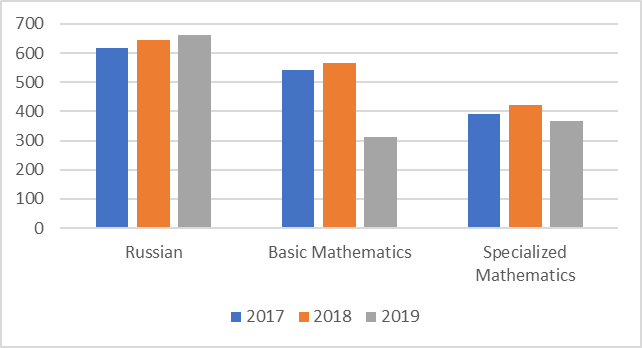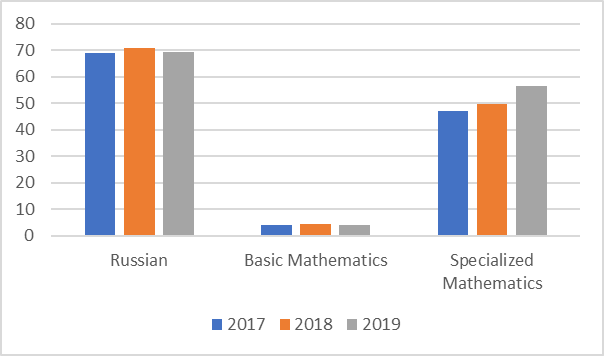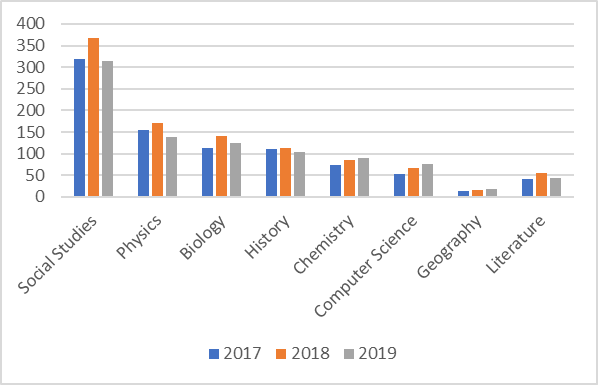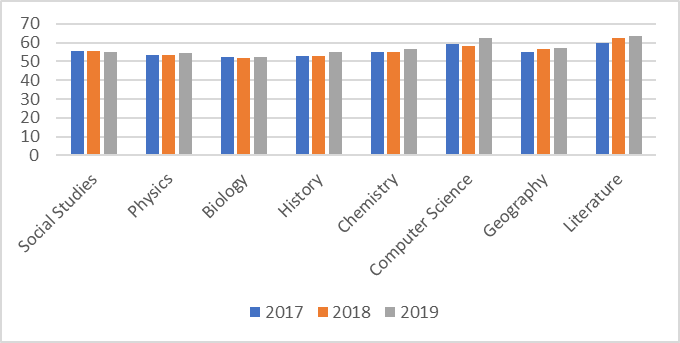Abstract
The changes in the preferences of graduates of Russian secondary educational institutions are studied herein based on an analysis of the dynamics of the results of the unified state exam for 2017-2019. A comparison of the changes in the selection of subjects for passing the Unified State Examination (USE) with the changes in the order of passage and in the list of entrance examinations is performed. If 5-7 years ago, the undisputed leaders in the competition among the applicants were such fields of training as Economics, Law, Management, then currently these fields are losing their leading positions in favor of the technical fields of training. Despite the absence of the official results for the enrollment campaign of 2019, many university representatives have already declared that 2019 was a record year for the number of applications submitted for the fields of training related to computer science, computer engineering, software engineering, applied mathematics and other IT specialties. The highest competition was recorded in these fields of training. It was in these fields of training that the minimum passing score increased by 25-35 points compared to the previous year. All these facts are of interest from the point of view of the reasons that influenced the formation of the increased demand for physical and mathematical fields of training. Having collected the statistical data from official sources, the authors analyzed the USE results in dynamics for 2017, 2018, 2019 and identified the trends in the preferences of the applicants.
Keywords: Unified State Examination (USE)resultsUSE average scorefields of training
Introduction
The graduates of Russian secondary schools pass the unified state examination (USE) regularly. On the one hand, passing the USE is required to obtain a secondary school diploma. Only those graduates who pass successfully the exam in compulsory subjects (the Russian language and Mathematics) ( Prakhov, 2015) can receive a secondary school diploma. On the other hand, having successfully passed the USE in the subjects required for matriculation to a university, the graduate gets the opportunity to become a student at a prestigious educational institution in a demanded profession. Thus, the preparation for the USE and selection of the exams is a very responsible step for the graduates of secondary schools.
Problem Statement
The list of entrance examinations required for matriculation to higher education programs for bachelor and specialty programs was approved by the order of the Ministry of Education and Science No. 1204 dated 04.09.2014 as amended ( The Ministry of Education and Science of the Russian Federation, 2017). According to this order, the Russian language is compulsory for all applicants. Then, depending on the specialty or field of training, the second mandatory examination and the third university choice exam are approved from a number of those listed ( Grebnev, 2016). For example, specialized Mathematics is the second exam required for the economics and management, chemical and technological blocks of specialties, as well as for the technical areas of training and engineering ( Smyk, Prusova, Zimanov, & Solntsev, 2019). In most universities, the university choice exam for the enlarged groups "Economics and Management", "Jurisprudence", "Sociology" is social studies, and for information and technical ones – Physics or Computer Science. For such fields of training as journalism, philology, linguistics, jurisprudence or medical business, specialized Mathematics is not required and it is enough to pass successfully the exam in basic level Mathematics ( Mashinyan & Kochergina, 2019).
Previously, it was possible to take the USE in two levels of Mathematics. Since 2019, the graduates have to choose between the examinations in basic or specialized Mathematics, that is, they have to focus on the technological or humanitarian profile of the preparation at a university.
It is logical to assume that the choice of subjects for passing the USE will be grouped between the humanitarian (basic Mathematics, History, Social Studies, Foreign Language) and the technological unit (Specialized Mathematics, Physics, Computer Science) ( Pishnyak & Khalina, 2015).
The enlarged group "Economics and Management", on the one hand, refers to the humanitarian, this explains the need to pass the USE in Social Studies, on the other hand, it requires knowledge of Economic, Mathematical, Econometric and Statistical Methods, i.e. more advanced Math.
Research Questions
The number of budget places in Russian universities reduces year by year. For example, in 2015, more than 217 thousand people were qualified for free tuition, but in 2019 the number of budget places decreased by 18% and amounted to almost 179 thousand.
The main share of reductions concerned the budget places allocated to the enlarged group "Economics and Management". For example, in 2015, 18.8 thousand students were qualified for free tuition, in 2019 only 9.3 thousand budget places were allocated, which was 2 times less.
Given the annual reduction in the number of budget places for these fields of training, gradually, "Economics and Management" may be squeezed out of the educational services market due to the fact that, having a mathematical (technological) mentality, the applicants will choose to pass Physics and Computer Science, instead of Social Science. To confirm or refute the hypothesis, the dynamics of the USE results should be studied ( Nurieva & Kiselev, 2016), including the distribution of subjects.
Purpose of the Study
The purpose of the research is to analyze the dynamics of the USE results from 2017 to 2019. The result of the analysis should be the identification of trends in the preferences of graduates, which, of course, will affect both the quality of matriculation to Russian universities and completion of the allocated free tuition (budget) places.
This is not the first study of the team of authors concerned with to the problems of university education. Earlier, an analysis of the demand for specialties and fields of training at Russian universities in the labor market has already been carried out ( Nakhratova, Ilina, Zotova, Urzha, & Starostenkov, 2017). The possibility of improvement of the educational environment through the gamification of the educational process has been studied ( Kirillov, Vinichenko, Melnichuk, & Vinogradova, 2016).
Research Methods
Empirical research methods such as comparison and measurement, as well as the methods used at the theoretical level of research: abstraction, analysis and synthesis, etc. were used as research methods. Using the data of a previous study on the analysis of the demand for specialties and fields of training at Russian universities in the labor market, as well as the USE results retrieved from the Ucheba.ru portal for 2017 ( Bulanova, 2017), 2018 ( Bulanova, 2018) and 2019 ( Ucheba, 2019), all information was tabulated and analyzed. For the purpose of the analysis, the information on the approved USE exams was used depending on the field of training.
Findings
The following results of the research have been obtained. The number of graduates in Russian schools is increasing every year (

Fig.

average score in the Russian language is about 70 points. The average USE score in basic Mathematics in 2019 increased by 6.7 points compared to 2018 and by 9.4 points compared to 2017. The most popular elective subject is traditionally Social Studies, which is chosen by about half of the graduates. However, in 2019 the number of applicants decreased by 15% compared to 2018. Physics, Biology, History, Chemistry and Computer Science also remain the most popular subjects (

At the same time, only a few subjects show positive dynamics: Chemistry, Computer Science and Geography. The largest increase is observed in Computer Science: by 12% in 2019 compared to 2018, and by 41.5% compared to 2017. This fact may indicate that the interest of applicants in the fields of training related to chemical technologies, medicine, pharmacy, biotechnology, and IT areas is increasing. If this is so, then the applicants should prepare harder for these exams (

Indeed, it is these subjects that showed a significant increase in the average USE score in 2019: the average score in Computer Science increased by 4 points, in Chemistry – by 1.6 points, in Physics – by 1.2 points, in Geography – by 0.6 points.
Conclusion
Thus, the analysis of the results indicates the growing popularity of physical, mathematical and technical fields of training among the graduates and applicants. In the near future, it will be possible to observe a clearer division of the applicants into "techies" and the people of a humanities bent. With this in mind, the enlarged group "Economics and Management" remains in the middle, at the junction. Without state support, this direction cannot exist for a long time. Most likely, there will remain several specialized economic and financial universities, other universities that implement programs in this field of training will have to reorient their activities in accordance with the needs of the labor market.
References
- Bulanova, A. (2017). USE-2017. As it was. Retrieved from: https://www.ucheba.ru/article/5350 Accessed: 14.10.2019. [in Rus.].
- Bulanova, A. (2018). USE-2018 results. Retrieved from: https://www.ucheba.ru/article/6217# Accessed: 14.10.2019. [in Rus.].
- Grebnev, L. S. (2016). Evolution of the unified state exam: View from educational assessment tools. Higher Education in Russia, 10, 79-92. [in Rus.].
- Kirillov, A. V., Vinichenko, M. V., Melnichuk, Yu. A., & Vinogradova, M. V. (2016). Improvement in the learning environment through gamification of the educational process. International Electronic Journal of Mathematics Education, 11(7), 2071-2085.
- Mashinyan, A. A., & Kochergina, N. V. (2019). Directions for improvement of the federal state educational standard of secondary education. Prospects for Science and Education, 3(39), 44-54. [in Rus.].
- Nakhratova, E. E., Ilina, I. Yu., Zotova, A. I., Urzha, O. A., & Starostenkov, N. V. (2017). Analysis of the relevance of educational programs for applicants and the labor market. European Research Studies Journal, 20(3A), 649-659.
- Nurieva, L. M., & Kiselev, S. G. (2016). Results of the unified state exam: Experience of interregional comparisons. Education and Science, 10(139), 11-38. [in Rus.].
- Pishnyak, A., & Khalina, N. (2015). Perception of a successful passing of State Final Testing (SFT) and United State Exam (USE) by parents of Moscow school students: Opportunities and drawbacks. Education Issues, 3, 144-170. [in Rus.].
- Prakhov, I. A. (2015). Barriers limiting access to quality higher education in the context of the USE: Family and school as constraining factors. Education Issues, 1, 88-117. [in Rus.].
- Smyk, A. F., Prusova, V. I., Zimanov, L. L., & Solntsev, A. A. (2019). Study of the scale and the reasons of student dropout from technical university. Higher Education in Russia, 28(6), 52-62. [in Rus.].
- The Ministry of Education and Science of the Russian Federation (2017). The List of Entrance Tests for Matriculation to Higher Education Programs – Bachelor and Specialty Programs. Approved by the order of the Ministry of Education and Science of the Russian Federation of September 4, 2014 No. 1204. Retrieved from: http://base.garant.ru/70751060/53f89421bbdaf741eb2d1ecc4ddb4c33/#ixzz61zeYY4V3. Accessed: 14.10.2019 [in Rus.].
- Ucheba (2019). USE-2019 in figures. Retrieved from: https://www.ucheba.ru/article/6334# Accessed: 14.10.2019. [in Rus.].
Copyright information

This work is licensed under a Creative Commons Attribution-NonCommercial-NoDerivatives 4.0 International License.
About this article
Publication Date
09 March 2020
Article Doi
eBook ISBN
978-1-80296-078-5
Publisher
European Publisher
Volume
79
Print ISBN (optional)
-
Edition Number
1st Edition
Pages
1-1576
Subjects
Business, business ethics, social responsibility, innovation, ethical issues, scientific developments, technological developments
Cite this article as:
Skrynchenko, B. L., Melnichuk*, Y. A., & Jukova, E. E. (2020). Trends In Preferences Of Russian School Graduates: Analysis Of Examination Results. In S. I. Ashmarina, & V. V. Mantulenko (Eds.), Global Challenges and Prospects of the Modern Economic Development, vol 79. European Proceedings of Social and Behavioural Sciences (pp. 1144-1149). European Publisher. https://doi.org/10.15405/epsbs.2020.03.164
